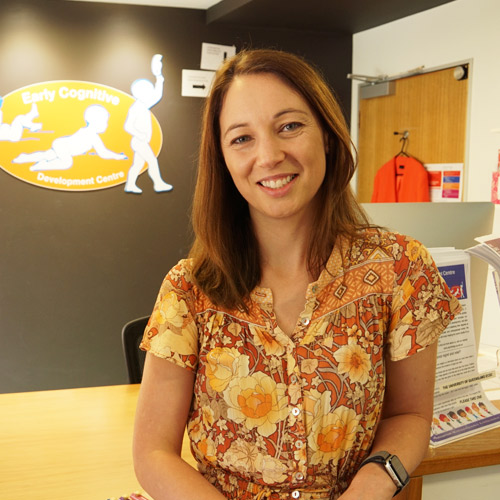 Each month we shine the spotlight on a researcher within the Faculty of Health and Behavioural Sciences.
Each month we shine the spotlight on a researcher within the Faculty of Health and Behavioural Sciences.
This month we caught up with Dr Aisling Mulvihill, a postdoctoral researcher in Early Cognitive Development Centre within the UQ School of Psychology. Aisling’s research activities span the topics of social cognition and self-regulation from early childhood to adolescence.
Tell us about yourself and what drew you to this field?
I’m originally from Ireland but have been living in Australia now for 13 years. I completed my undergraduate studies in Dublin before going on to work clinically as a speech pathologist. During my time as a speech pathologist, I worked in the public health and education sectors, and in private practice.
One of my private practice roles involved working closely with an educational and developmental psychologist. In this role I performed developmental diagnostic assessments and helped children with diagnoses of Developmental Language Disorder (DLD), Autism Spectrum Disorder (ASD), and Attention Deficit Hyperactivity Disorder (ADHD), build social and regulatory skills. I became particularly interested in this area which led to the co-authorship of a series of children’s books, the Ant Patrol Children’s Stories, with my colleague Dr Deberea Sherlock. The books aimed to introduce a collection of social and self-regulatory skills to young children and their parents through fun engaging stories.
Driven by a passion to better understand social and self-regulatory skill development in young children, I decided to shift my focus from clinical work and embark on a PhD in Developmental Psychology. My PhD focused on the development and use of self-talk for self-regulation in children who are typically developing and children who experience developmental challenges.
After completing my PhD I applied for a postdoc with Professor Virginia Slaughter in the Early Cognitive Development Centre and was very lucky to attain this position.
Tell us about your research?
My current research focuses on environmental factors associated with social cognitive development (i.e., social understanding) in young children. Social cognition allows us to identify and interpret our own and other’s social actions and is important for children’s prosocial behaviour and successful peer relationships. Children who have better social understanding are more likely to make and maintain friendships.
A key focus of this research is to examine the association between adult language use (e.g., parents and educators) and the development of children’s social understanding. For example, one current research study aims to examine how mothers’ language is associated with the development of social understanding in children with Developmental Language Disorder aged 2.5-8years. It is hoped that this information can inform later interventions to support social development for this group of children. Find out more about this study.
Tell me about the experience of completing your PhD?
Overall, I thoroughly enjoyed my experience as a PhD student. I believe the key to this was a supportive supervisory team and engaging in an area of research that I was passionate about. Furthermore, I met wonderful friends along the journey with similar interests and goals. Honestly, I find research addictive. It is difficult to not want to take that next step, to ask one more question, and to better understand.
The challenge of undertaking a PhD after many years of clinical work was that feeling of knowing that I did not have the answers, that I had so much learning to do, and that I was not, and never will be an expert! Research is very humbling as no matter where you are on your journey there are always further skills to learn, further questions to be answered, and improvements to be made.
What do you hope to achieve through your work or research?
My aim is to support greater understanding of how children develop social and self-regulatory abilities and to create tangible, accessible and evidence-based information and programs for parents, educators and clinicians to support the social and regulatory development of all children, but in particular those with developmental challenges.
What is the most rewarding part of what you do?
That is easy – working with children is by far the most rewarding part of what I do. Additional to that I love working alongside others who have a passion for supporting children’s learning, social and emotional outcomes.
What developments are you noticing in the field of psychology?
One development in my area of research is a shift towards inclusive research practices that recognise the importance of including key stakeholders in research design, implementation, and communication. Essentially this creates the ‘we’ rather than the ‘them’ and ‘us’ in research. For example, when aiming to better understand the social development of children with DLD it is important that I engage with adults with DLD, parents with children who have DLD and speech pathologists and other allied health who support children with DLD. In the long-term I believe that this will be important for translating research so that it can have real impact in an individuals’ life.
For students and graduates who want to work with individuals who are neurodivergent it is important not to take the ‘expert’ role and to work collaboratively with neurodivergent individuals and their families. Take the time to listen and understand so as to respectfully support neurodivergent individuals and their families in achieving their goals.



